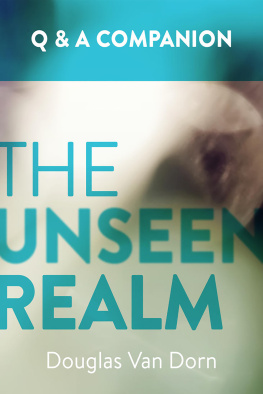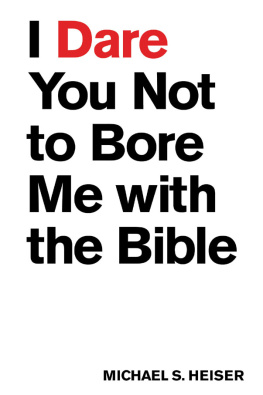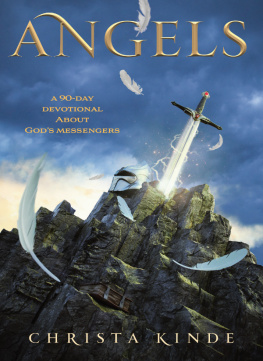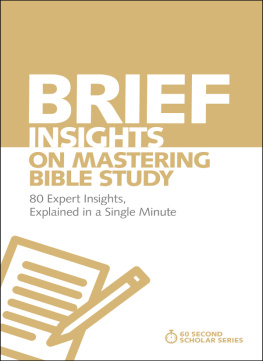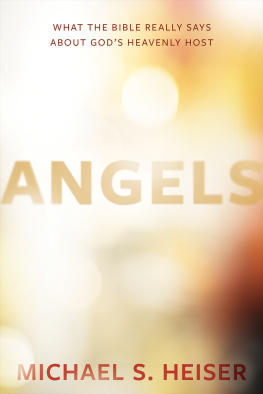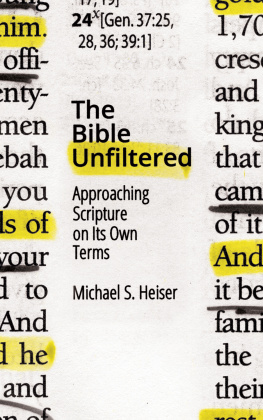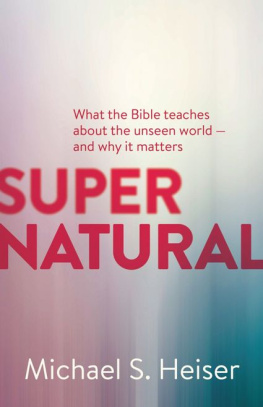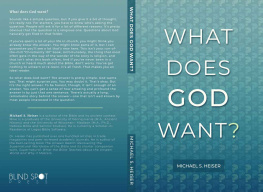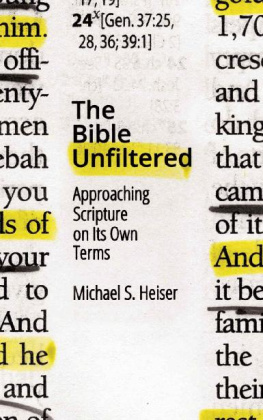THE UNSEEN REALM
Recovering the supernatural worldview of the Bible
Michael S. Heiser

The Unseen Realm
Copyright 2015 by Michael S. Heiser
Lexham Press, 1313 Commercial St., Bellingham, WA 98225
LexhamPress.com
All rights reserved. You may use brief quotations from this resource in presentations, articles, and books. Otherwise, no part of this publication may be reproduced, stored in a retrieval system, or transmitted in any form or by any meanselectronic, mechanical, photocopy, recording, scanning, or any otherwithout the prior permission of Lexham Press. Email us at .
Unless otherwise noted, Scripture quotations are from the Lexham English Bible ( LEB ), copyright 2013 by Lexham Press. Lexham is a registered trademark of Faithlife Corporation.
Scripture quotations marked ESV are taken from The Holy Bible, English Standard Version, copyright 2001 by Good News Publishers. Used by permission. All rights reserved.
Scripture quotations marked as KJV are taken from The Holy Bible, King James Version.
Scripture quotations marked NASB are taken from the New American Standard Bible. Copyright 1960, 1962, 1963, 1968, 1971, 1972, 1973, 1975, 1977, 1995 by The Lockman Foundation. Used by permission.
Scripture quotations marked as NRSV are taken from the New Revised Standard Version of the Bible, copyright 1989 by the Division of Christian Education of the National Council of Churches of Christ in the United States of America, and are used by permission. All rights reserved.
In Scripture quotations, emphasis in boldface was added by the author and was not part of the original translation.
Transliteration of words from biblical Hebrew and Greek, along with other ancient languages, has been simplified for English-only readers. More precise transliteration is used only when required by the discussion.
Unless otherwise noted, all maps, illustrations, and photos are provided by Lexham Press.
ISBN 978-1-57-799556-2
Editor: David Lambert
Cover Design: Andy Meyer
First Edition
To Roger
Someday when the Lord sits me down to have a talk about this,
Im going to remind him that you started it.
Contents
W E ALL HAVE WATERSHED MOMENTS IN LIFE, CRITICAL TURNING POINTS where, from that moment on, nothing will ever be the same.
One such moment in my own lifethe catalyst behind this bookcame on a Sunday morning in church while I was in graduate school. I was chatting with a friend who, like me, was working on a PhD in Hebrew studies, killing a few minutes before the service started. I dont recall much of the conversation, though Im sure it was something about Old Testament theology. But Ill never forget how it ended. My friend handed me his Hebrew Bible, open to Psalm 82 . He said simply, Here, read that look at it closely.
The first verse hit me like a bolt of lightning:
God [ elohim ] stands in the divine assembly;
he administers judgment in the midst of the gods [ elohim ].
Ive indicated the Hebrew wording that caught my eye and put my heart in my throat. The word elohim occurs twice in this short verse. Other than the covenant name, Yahweh, its the most common word in the Old Testament for God. And the first use of the word in this verse worked fine. But since I knew my Hebrew grammar, I saw immediately that the second instance needed to be translated as plural. There it was, plain as day: The God of the Old Testament was part of an assemblya pantheonof other gods.
Needless to say, I didnt hear a word of the sermon. My mind was reeling.
How was it possible that Id never seen that before? Id read through the Bible seven or eight times. Id been to seminary. Id studied Hebrew. Id taught for five years at a Bible college.
What did this do to my theology? Id always thoughtand had taught my studentsthat any other gods referenced in the Bible were just idols. As easy and comfortable as that explanation was, it didnt make sense here. The God of Israel isnt part of a group of idols. But I couldnt picture him running around with other real gods, either. This was the Bible, not Greek mythology. But there it was in black and white. The text had me by the throat, and I couldnt shake free.
I immediately set to work trying to find answers. I soon discovered that the ground I was exploring was a place where evangelicals had feared to tread. The explanations I found from evangelical scholars were disturbingly weak, mostly maintaining that the gods ( elohim ) in the verse were just menJewish eldersor that the verse was about the Trinity. I knew neither of those could be correct. Psalm 82 states that the gods were being condemned as corrupt in their administration of the nations of the earth. The Bible nowhere teaches that God appointed a council of Jewish elders to rule over foreign nations, and God certainly wouldnt be railing against the rest of the Trinity, Jesus and the Spirit, for being corrupt. Frankly, the answers just werent honest with the straightforward words in the text of Psalm 82 .
When I looked beyond the world of evangelical scholarship, I discovered that other scholars had churned out dozens of articles and books on Psalm 82 and Israelite religion. Theyd left no stone unturned in ferreting out parallels between the psalm and its ideas and the literature of other civilizations of the biblical worldin some cases, matching the psalms phrases word for word. Their research brought to light other biblical passages that echoed the content of Psalm 82 . I came to realize that most of what Id been taught about the unseen world in Bible college and seminary had been filtered by English translations or derived from sources like Miltons Paradise Lost .
That Sunday morning and its fallout forced a decision. My conscience wouldnt let me ignore my own Bible in order to retain the theology with which I was comfortable. Was my loyalty to the text or to Christian tradition? Did I really have to choose between the two? I wasnt sure, but I knew that what I was reading in Psalm 82 , taken at face value, simply didnt fit the theological patterns I had always been taught. And yet there had to be answers. After all, the passages I had only now noticed had also been read by apostles like Pauland by Jesus himself, for that matter. If I couldnt find help in finding those answers, I would just have to put the pieces together myself.
That journey has taken fifteen years, and it has led to this book. The path has not been easy. It came with risk and discomfort. Friends, pastors, and colleagues at times misunderstood my questions and my rebuttals of their proposed answers. Conversations didnt always end well. That sort of thing happens when you demand that creeds and traditions get in line behind the biblical text.
Clarity eventually prevailed. Psalm 82 became a focal point of my doctoral dissertation, which also examined the nature of Israelite monotheism and how the biblical writers really thought about the unseen spiritual realm. I wish I could say that I was just smart enough to figure things out on my own. But in reality, even though I believe I was providentially prepared for the academic task I faced, there were times in the process when the best description I can give is that I was led to answers.
I still believe in the uniqueness of the God of the Bible. I still embrace the deity of Christ. But if were being honest when we affirm inspiration, then how we talk about those and other doctrines must take into account the biblical text.
What youll read in this book wont overturn the important applecarts of Christian doctrine, but youll come across plenty of mind grenades. Have no fearit will be a fascinating, faith-building exercise. What youll learn is that a theology of the unseen world that derives exclusively from the text understood through the lens of the ancient, premodern worldview of the authors informs
Next page


